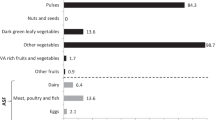Abstract
Objective: To study the effect of consumption of dark green leafy vegetables (DGLV) and sweet pumpkin on serum β-carotene and retinol concentrations in children treated for Ascaris lumbricoides.
Design: Experimental study with a randomised design.
Subjects: A total of 110 primary school children aged 8–12 y in northwestern Bangladesh.
Interventions: All children were de-wormed and 2 weeks later randomly assigned to one of three groups to receive for 6 days per week, for 6 weeks, one complete meal containing either: (1) 4.4 mg beta-carotene from DGLV (n=37, after 18 dropouts); (2) 1.5 mg beta-carotene from sweet pumpkin (n=36, 18 dropouts); or (3) vegetables containing virtually no beta-carotene (control) (n=37, 18 dropouts).
Results: Significant increases (P<0.001) in mean serum β-carotene concentrations were seen in all three study groups, with a statistically higher increase (µmol/l) in the DGLV group (0.44; 95% confidence interval (CI) 0.32, 0.55) compared to the control group (0.20; 95% CI 0.14, 0.26; P=0.002). The increase in serum retinol (µmol/l) was statistically significant (P=0.04) only in the DGLV group (mean 0.066; 95% CI 0.002, 0.13), but this increase was not different from the increase in the control group.
Conclusion: In children successfully treated for Ascaris lumbricoides, a substantial increase in serum β-carotene was seen after feeding with a moderately high cumulative dose of DGLV for 6 weeks.
Sponsorship: Sarec (Swedish Agency for Research Cooperation in Developing Countries) (SWE-1996-155) and InDevelop, Uppsala University.
European Journal of Clinical Nutrition (2001) 55, 1–9
This is a preview of subscription content, access via your institution
Access options
Subscribe to this journal
Receive 12 print issues and online access
$259.00 per year
only $21.58 per issue
Buy this article
- Purchase on Springer Link
- Instant access to full article PDF
Prices may be subject to local taxes which are calculated during checkout
Similar content being viewed by others
Author information
Authors and Affiliations
Contributions
Guarantor: V Persson.
Contributors: VP, FA, MG-M and TG were involved in the concept and planning. FA and MG-M were responsible for laboratory analyses. VP, FA and TG carried out the field work. VP and TG analysed the data. VP, FA, MG-M and TG wrote the paper.
Corresponding author
Rights and permissions
About this article
Cite this article
Persson, V., Ahmed, F., Gebre-Medhin, M. et al. Increase in serum beta-carotene following dark green leafy vegetable supplementation in Mebendazole-treated school children in Bangladesh. Eur J Clin Nutr 55, 1–9 (2001). https://doi.org/10.1038/sj.ejcn.1601108
Received:
Revised:
Accepted:
Published:
Issue Date:
DOI: https://doi.org/10.1038/sj.ejcn.1601108


